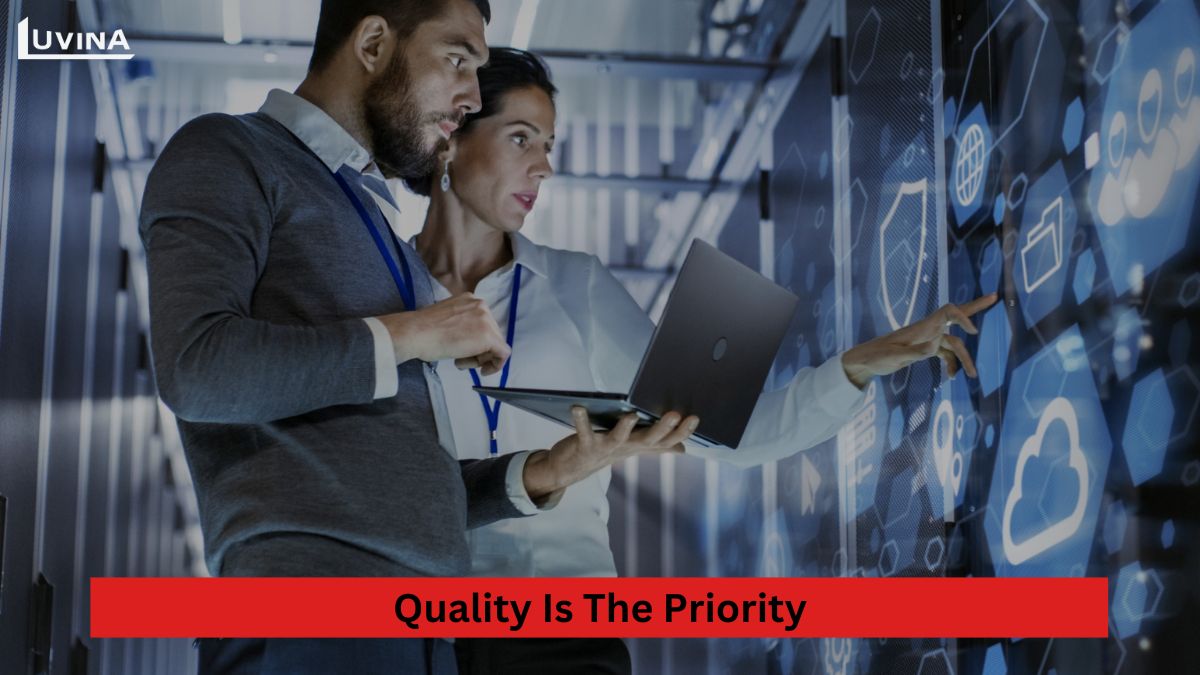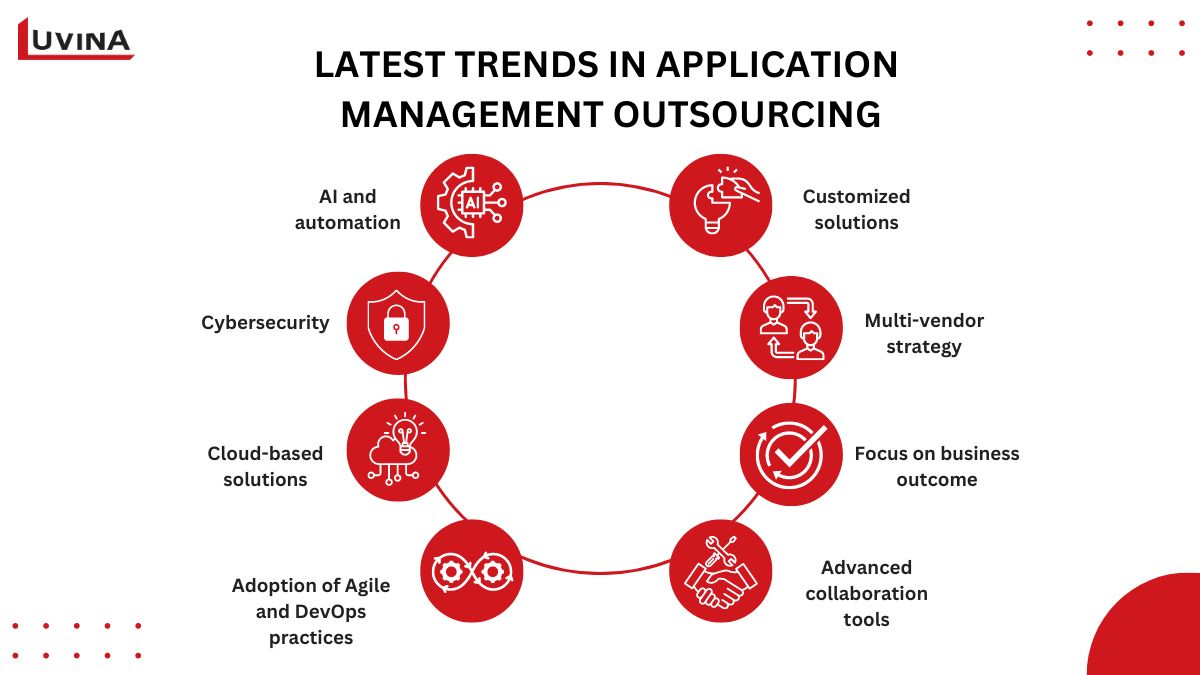Many businesses see application management outsourcing as a great way to tap into expert skills in today’s fast-changing tech world. As companies depend heavily on applications, managing them through outsourcing is essential for maintaining smooth and secure operations. What exactly does application management outsourcing entail? What are the benefits and challenges it presents? Should your company consider this service? We’ll address all these questions in the following article.
What is Application Management Outsourcing (AMO)?
Application management outsourcing is related to hiring an external company to take care of applications of a business. This usually includes developing, maintaining, enhancing, and supporting the application. By relying on specialized application management outsourcing providers, businesses can make sure their applications run smoothly, and securely, and meet their evolving needs.

This approach can cut down operational costs, improve service quality, and let internal IT teams focus on key business activities and strategic goals. Plus, application management outsourcing offers access to the latest technologies and industry best practices, ensuring ongoing improvement and innovation in managing applications.
Reasons for Businesses to Outsource Their Application Solutions
As technology advances, the business market becomes increasingly competitive. In this context, application management outsourcing becomes a crucial factor for businesses to adapt flexibly.
Application management outsourcing allows businesses to delegate the responsibility of managing and maintaining software applications to specialized service providers. This provides businesses access to a diverse pool of expertise through skilled teams. These experts deliver high-quality services and ensure efficient management of applications. Additionally, using professional application management services enables businesses to scale IT resources comfortably without being limited by internal capabilities. This scalability and flexibility are essential for handling varying workloads and adapting to changing business needs.
Partnering with specialized providers also enhances risk management, as they have expertise in implementing security measures and compliance protocols, reducing the risk of data breaches and minimizing downtime. Outsourcing partners often lead in technological advancements, introducing new tools and best practices to improve application performance. Many also offer 24/7 support to ensure continuous monitoring and maintenance, minimizing downtime and addressing issues promptly.

Another benefit of outsourcing application management is cost savings. Outsourcing helps organizations reduce expenses related to hiring, training, and maintaining an internal IT team.
>> Also read: 7 Key Benefits Of Application Management Services
Application Management Outsourcing Challenges
Application management outsourcing can be very beneficial for businesses, but it also comes with some challenges.
Lack of communication and coordination
For application management outsourcing to work well, your business and the service provider need to communicate effectively and coordinate closely. Problems can arise due to different time zones, cultures, and ways of communicating.
- Tip: Make sure to set up clear ways to communicate and keep detailed records so everyone understands the processes and information.
Security and compliance Issues
Outsourcing application management means sharing your sensitive data with external providers, which increases the risk of security breaches.
- Tip: Ensure that providers follow strict security protocols and comply with relevant regulations. Set clear security requirements and conduct regular audits to protect your systems and data.
Service quality
The performance of outsourced application management providers may not always meet your standards. Poor service can negatively affect application performance and user satisfaction.
- Tip: Specify detailed service level agreements (SLAs), set performance metrics, and regularly monitor these metrics to maintain quality.

Dependency on the provider
Dependency is inevitable when you choose application management outsourcing. This reliance becomes more apparent if the provider’s performance declines or if you need to terminate the partnership.
- Tip: Prepare an exit strategy, including knowledge transfer plans, technology handover, and backup resources.
Hidden costs
While application management outsourcing can save costs, hidden expenses can undermine these savings. Hidden costs may include service transition costs, expenses related to unexpected issues, and relationship management costs.
- Tip: Carefully analyze the total costs and maintain a detailed budget to account for any hidden expenses.
Loss of Control
Using application management outsourcing services can make your business feel less in control of its IT operations. This can lead to misalignment between IT services and business goals or slow responses to changing needs.
- Tip: Build a strong governance structure, clearly define roles and responsibilities, and actively participate in management and decision-making to maintain control and alignment.
Choose the right Application Management Outsourcing Provider
The quality and effectiveness of application management heavily depend on choosing the right outsourcing service providers. To select the right provider, here are some criteria you should consider:
- Business requirements: Understand exactly what your company needs from application management outsourcing. What services are you looking for? What’s the project about? What are your long-term goals? The clearer you are, the easier it will be to find the right provider.
- Provider’s expertise and experience: Look at the provider’s past work to see if they have managed similar applications before. Check if they have relevant industry certifications that show they have the skills needed for your technology and applications.

- Security and compliance capabilities: Make sure the application management outsourcing provider follows security practices and meets all relevant regulations and standards. This helps protect your sensitive data and ensures you stay on the right side of the law.
- Service Level Agreements (SLAs): Check the provider’s SLAs to know what level of service you can expect. Look at some key factors like response times, resolving issues times, and performance standards.
- Technical capabilities: Check out the provider’s technical skills, including the tools and methods they use. Ensure they’re using the latest technology and can easily work with your existing systems.
- Scalability and flexibility: The application management provider should have the capacity to scale services according to your company’s needs.
- Cost: Clarify the cost structure and ensure it fits within your budget. Also, consider the overall value provided, meaning the balance between cost and the quality of services received, rather than just focusing on the price.
- Communication and collaboration: The success of application management outsourcing depends heavily on communication. Therefore, the service provider must have effective communication processes and tools to facilitate clear and transparent collaboration. Cultural compatibility is as important as communication and collaboration. The provider’s work ethic and business practices should align with your company’s values to ensure a harmonious and effective partnership.
- Exit strategy: Develop a clear exit strategy. This includes understanding the process for transitioning services back in-house or to another provider if necessary, to minimize dependence on a single provider.
Latest Trends in application management outsourcing
According to predictions, application management outsourcing will continue to evolve to meet the needs of businesses and drive technological advancements. Here are some key trends that are expected to dominate the application management outsourcing field in the future:

- More use of AI and Automation: Application Management processes will increasingly integrate AI and automation for less human intervention, improved performance, cost savings and faster processing.
- Focus on Cybersecurity: Security measures that are advanced shall be integrated into application management outsourcing services for data protection purposes. The providers will prioritize creating strong security protocols, continuous system monitoring, adherence to industry regulations that protect sensitive data and applications.
- Cloud-based solutions: Application management outsourcing providers will move towards cloud computing for greater scalability, flexibility, and ease of integration with other cloud services.
- Adoption of Agile & DevOps practices: These practices allow for shorter development cycles, continuous delivery as well as better alignment between development and operations teams all aimed at enhancing efficiency in application management.
- Customized solutions: Tailoring solutions to business specific needs is now being emphasized by providers.
- Multi-vendor strategy: Increasingly, more and more companies now prefer to have multiple service providers to reduce risks and accommodate the strengths of various vendors. This strategy will, therefore, allow companies to derive greater benefits in technology and skill areas.
- Focus on business outcomes: Instead of merely focusing on IT metrics, outsourcing providers for application management now focus more on giving business outcome value, whether it pertains to revenue growth or customer satisfaction.
- Advanced collaboration tools: Advanced collaboration tools will be there to back up providers and businesses regarding coordination and communication, making project management and operations run smoothly.
How can Luvina help?
Application management is a multilayered and tiring process. But the good news is that you are not alone in this situation. Outsourcing application management companies are there to help you with the workload your IT team takes on and improving the performance of your applications.
By making use of professional application management, Luvina performs high-quality outsourcing application management services to see that your business applications are always at their peak of their capabilities. We are not only the ones that can help you revamp and update your applications, but the ones that can also control and guarantee the safety of your whole infrastructure so that your business can be entirely devoted to the main tasks. As of now, Luvina has three main types of application management outsourcing services:
- Analysis of Applications: Solving the root cause of issues inside the application by throwing away some of the factors that are wasting time (resources and time) and money.
- Feature Development and Expansion: Making the existing application features better and at the same time building up new ones to better serve the objectives of customers who have presented their demands.
- Reverse Engineering and Documentation: Drawing and reverse engineering approaches that allow businesses to adapt in a changing technological landscape-are the parts of the document.
By partnering with Luvina, your business will experience top-quality services certified with ISO 9001 and CMMI Level 3 standards. With a team of over 750 experienced IT professionals, Luvina ensures smooth application management, offers 24/7 support to address any issues, and can scale services up or down based on project requirements. Importantly, we prioritize security, committing to the utmost protection of all your data and intellectual property.
We have collaborated with numerous businesses across various industries and are confident in meeting your application management needs. Contact Luvina today to learn more about our application management outsourcing services.
Related Posts:









Read More From Us?
Sign up for our newsletter
Read More From Us?
Sign up for our newsletter